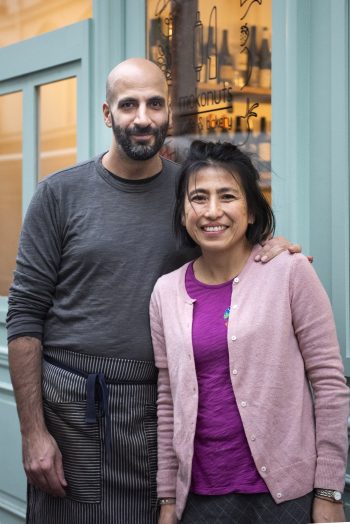
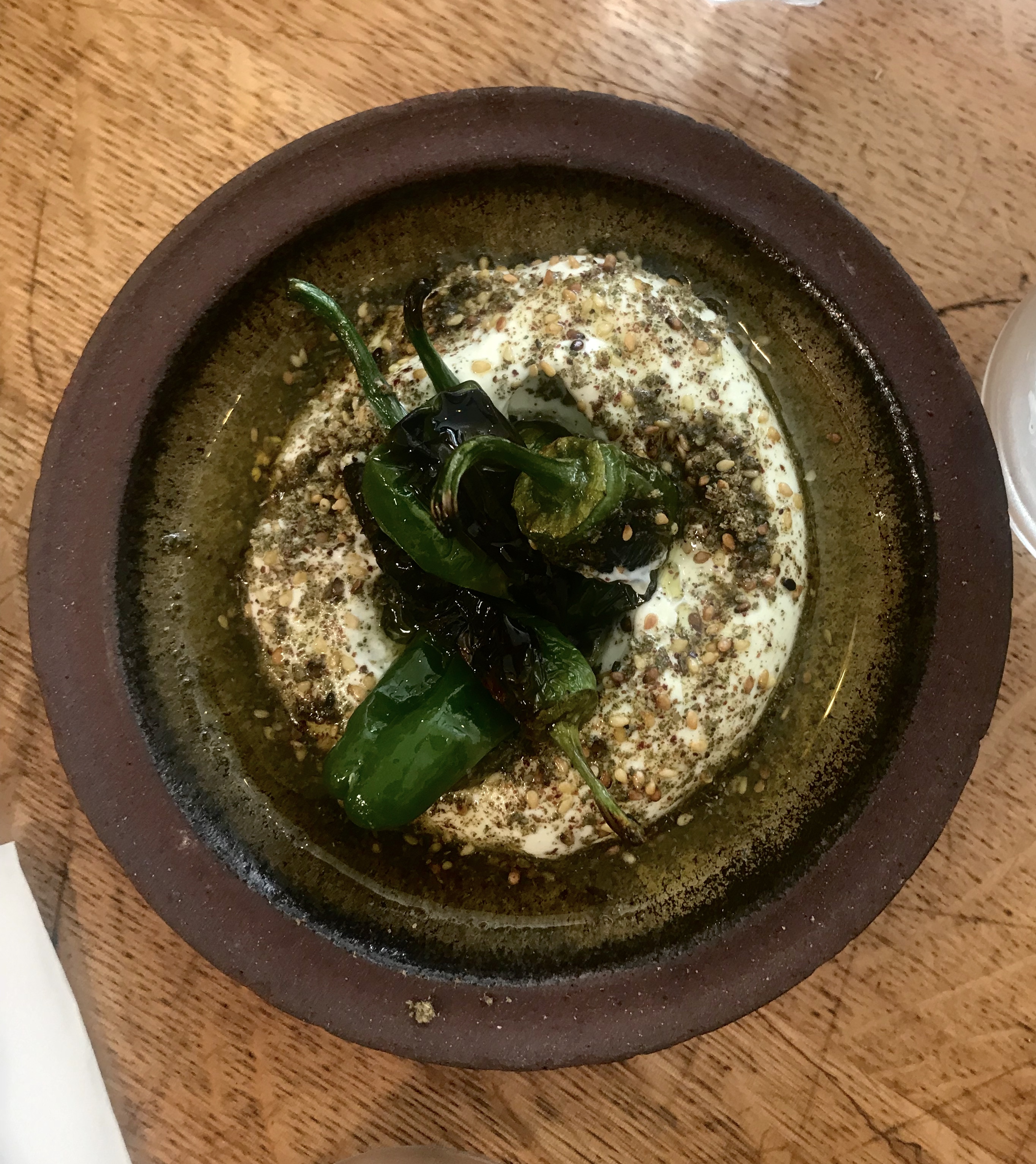
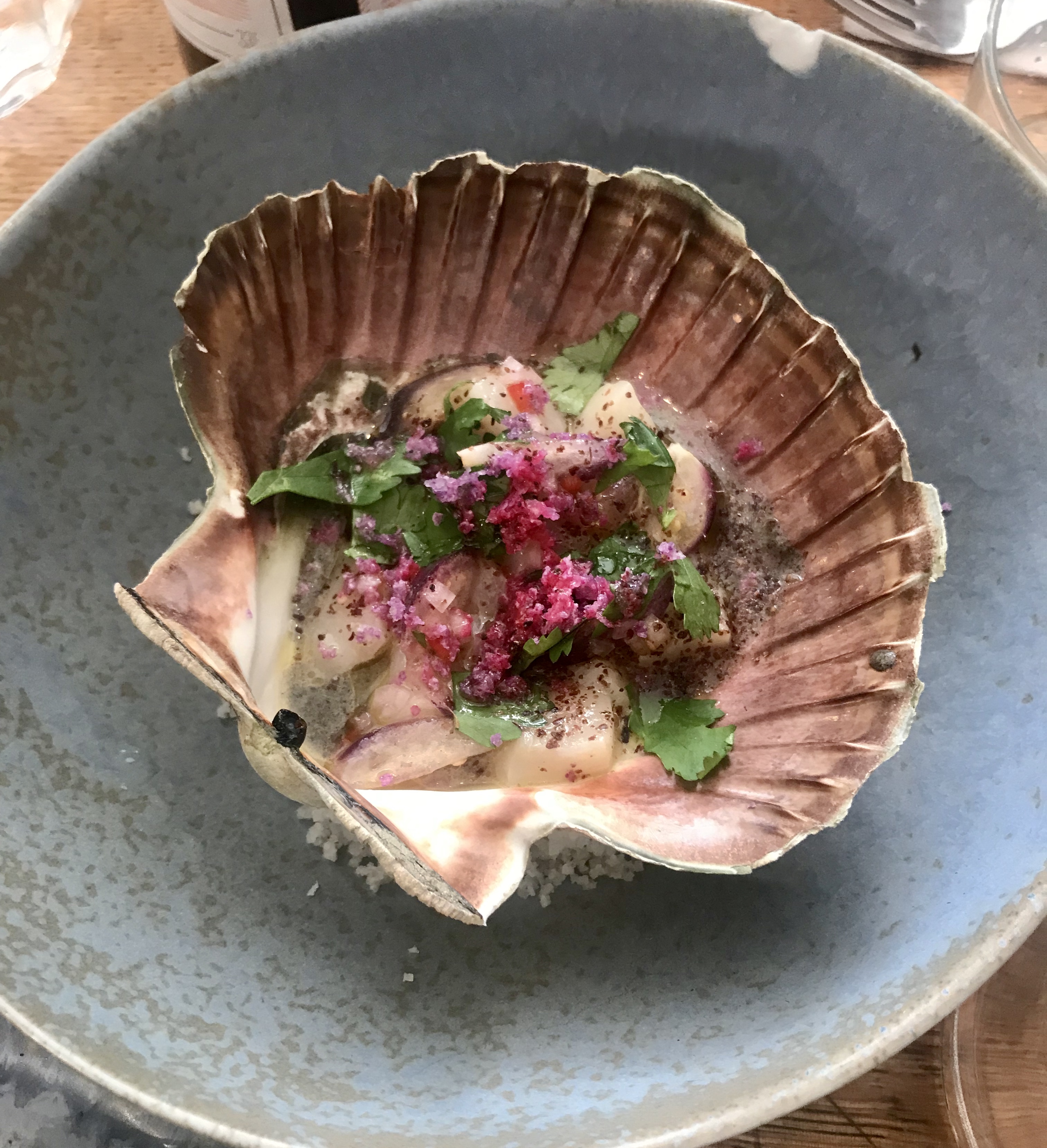
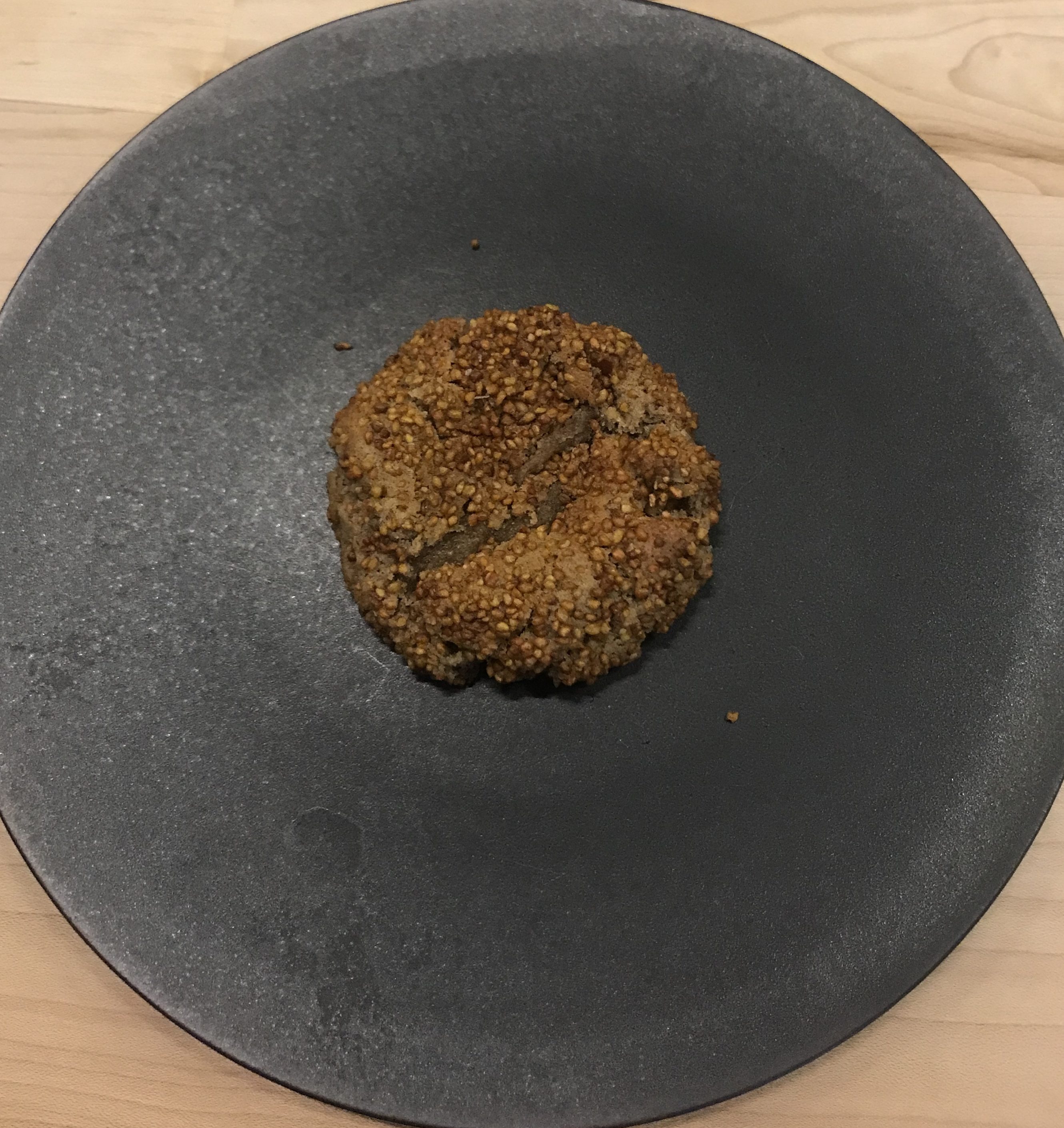
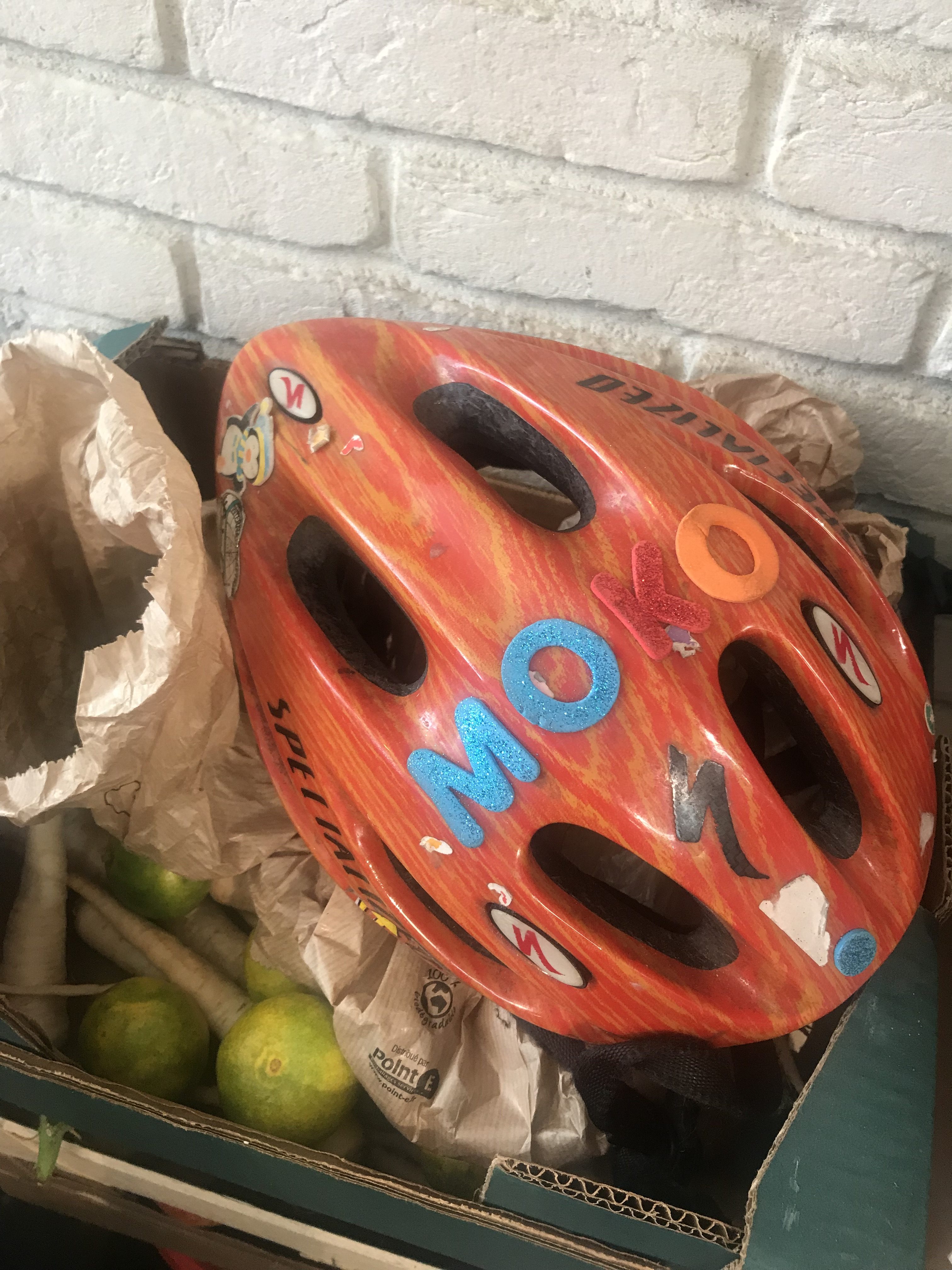
Moko & Omar,
Berlin,
March 7th, 2020
Portrait by Evan Sung
We were about to sit down when Omar pulled out a package of cheese out of his pocket. Quite tempted to eat it straight out of his hands, he stored it back into his pocket with a content smile. He and his wife Moko had just come back from a day full of market visits and kitchen prep for their lunch at ernst, a 12 seat restaurant in Berlin, the following day. After our interview, when the kids were asleep, Moko would go back to the restaurant to make sure the pavlova was good enough for tomorrow’s menu. I originally met Moko Hirayama and Omar Koreitem the previous fall, when I booked one of the almost-impossible-to-get, tables at the much-lauded bistro/café Mokonuts – a small and charming restaurant, with buzzing energy and incredibly delicious, seasonal food.
To see chefs cook outside their normal habitat is always interesting. But the care and kindness that Moko and Omar brought to the restaurant was uncommon and heart-warming. Little did we know that this would be one of the last services restaurants were allowed to run before complete shutdown. Two weeks later all gastronomy in Europe had to close due to Covid 19.
Now, after a forced pause of about four months restaurants are slowly reopening, among them Mokonuts. They have survived in the sense of being able to run service. But what the new regulations mean for a small place such as Mokonuts that thrives from the closeness to people, is hard to predict. For now, things are back to how they were in the very beginning
– just Moko and Omar in the kitchen, cooking delicious food from the soul.
You have so much great cheese in Paris. Did you find anything interesting at the market to cook with?
O I was just curious to see what they got. But yes, I like to cook a lot with cheese.
M Oh, Omar loves cheese.
O If there is one thing I really crave when I go to Japan for a long time it’s cheese. I have to have cheese in my life. And I need Japanese rice. When I can have rice with natto on top I am very happy.
Really, the gluey fermented soy beans?
O Yeah, I love natto. It’s my ultimate comfort food.
M I could also survive with just rice—that is the most Japanese thing about me I think. Sometimes I want it salty, with a crunchy bite to it and a little bit of scallions. Then I fry it in the pan. I could totally eat that now. Or a very good apple. Apple is my true obsession.
Oh really? I love apples and am obsessed too.
M I am extremely picky.
What is your favourite?
M It depends. I had to adjust my taste in Paris. But this year wasn’t a great season in general. I did not eat a single good apple in France. Elstar is usually good but only for the first two weeks. I told Omar to not order them anymore. In Japan Fujis are very good. And there is a type that is called Kougyoku which means red ball. In their first week they are incredible – crisp, juicy with a little hint of sourness. After that it becomes flat.
All the young people around us just thought we were fools giving away respected careers to cook.
Apples in Japan are so interesting, there’s so much less acidity. And they are expensive!
O Moko makes a really good tarte tatin.
Yes, I had it in October last year.
M What you had was a thin apple tarte actually but it had a tarte tatin-feel to it. I burnt it a bit though.
For me it was perfect as I like things charred. Overall your food is delicious but what makes eating at Mokonuts so interesting is the fact that you both had very different careers before becoming one of the busiest lunch places in Paris. How is it to so drastically change profession at a later time in life?
O Yeah, as cooks we had very humble beginnings. Being always the oldest in the kitchen we definitely learned the rough way. All the young people around us just thought we were fools giving away respected careers to cook. We had to learn quickly as we did not have a lot of time to waste. It was always challenging but we went up the ranks respectively fast wherever we worked.
When did you decide to make that radical change?
O I started cooking before Moko.
M Well, professionally but not personally. I was cooking since I was 10.
O Yeah, I actually was a terrible cook before it became a profession. But I always knew how to eat, what I liked and what I didn’t like.
How does one know how to eat?
O My dad was a very picky eater. He wanted to make sure as we grew up that we ate the right things. Candies were not allowed at home, we had no such things as coca cola. There were no cans, nothing frozen, none of that. Instead there was someone at home cooking real food from scratch every day. This instilled my love for good food. When I met Moko it amplified itself even more.
He is the mentor I never met, and the person I wanted to be in the kitchen.
What were you doing before?
O I went through many different phases. I wanted to become a filmmaker, an artist, a professor in poly science, because that is what I studied. I wanted to work for the UN but then eventually I became a cook.
What made you pursue this career in the end?
O The epiphany came in New York. I was walking around when I went into Barnes and Nobles where I stumbled upon the book from Thomas Keller.
The French Laundry?
O Yes, I was completely mesmerized from the moment I picked it up. I literally sat there for an hour and a half, flipping through each of these pages. When I closed the book I knew this is what I wanted to do. Then I told Moko about it and she agreed to support me.
M And I would make the money [laughs].
O The following year we cooked every single weekend from the French Laundry book. I would go to the green market and buy a 100$ worth of ingredients and try to replicate each and every recipe from the book. Do you remember that, Moko?
M Of course, I think I have done most of the desserts as well. We conquered pretty much the whole book.
O There is something about it…
M …it is very magical.
When I was 10 the kitchen was my natural habitat. I was making all sorts of cream puffs.
I have heard from many chefs that still to this day Thomas Keller is their number one influence. What is it about him?
O Yeah, there is something about him that to this day I still venerate. He is the mentor I never met, and the person I wanted to be in the kitchen. Graduating from cooking school – I did this night program which was just 6 months – I only had two options: Either I would go work at Keller’s Per Se or at Daniel with Daniel Boulud. I ended up going to the latter, even though I think if I had pushed a little more I could have gotten into Per Se. But maybe it is better that I never went.
M It is good to keep the beauty.
Moko, you said you were cooking and baking already as a child. Where did your initial love for pastry come from?
M My mom was and still is one of the best cooks in the world. And she is also a very good pastry chef, especially of French pastry. Early on I was surrounded by that culture. When I was 10 I was making all sorts of cream puffs. The kitchen was my natural habitat, I was always doing something. That was one of the reasons why I didn’t feel like I needed to go to pastry school. It has been my obsession for so long. One day somebody gave me this thin book about Austrian pastries, I still remember it vividly to this day. It wasn’t even a cookbook, more of an artsy pastry book. It had a few recipes in it but mainly it was a collection of stories about Sachertorte.
There is a few commonalities between law and baking.
I love how you pronounce Sachertorte, it sounds so special.
M This is how the Japanese say it.
That makes me think of the Baumkuchen obsession people have in Japan. I grew up with one certain kind and it still is a big tradition in my family to get it on Christmas’ Day.
O Oh, Moko loves Baumkuchen.
M But I didn’t live in Japan when that hype started.
Before you became famous for your cookies you were a successful lawyer. Is it as big of a leap as it seems – finance law and baking?
M Being a lawyer had its own fun, in the sense of accomplishment when you close the deal. One of my superiors once said to me: ‘Think about it, you are paid to think. You have these problems and need to find a logic and eventually a solution to it.’ That alone was satisfying and stuck with me. I think there is a few commonalities with law and baking.
Tell me…
M For me everything is based on logic, things fit into place or not. My first encounter with professional baking I had at Ladurée. I would go in in the morning before the office and also on the weekends I didn’t have to work. They were very nice to me, paid me as a commis patissière and even offered me a job. I said I actually have a really well-paid job, I don’t really need it. But they insisted. I did this for almost two years. In the end I was certain that pastry is what I wanted to do. I convinced Omar to move to France with me so I can work for all these beautiful places like Pierre Hermé.
I go through different phases with my obsession. I have this spread sheet with about 10 different recipes for one and the same thing.
Arriving in Paris, the hub of French pastry, what did you learn?
M That I didn’t fit in. First, it was impossible to find an internship mostly because I didn’t have a degree. Fabrice Le Bourdat from Blé Sucré was the only one who took me in, only because he was alone. If I could come in at 4 o’clock in the morning he said I would be more than welcome to help him. After that it got a bit easier and opportunities opened up. Not that the opportunity came to me but people would look at me slightly different. But still, wherever I worked everything I proposed people frowned upon, it was a nightmare. I was too old, just didn’t see things the same and also didn’t appreciate very much what they were doing.
So you moved to Paris and found out that you hate French pastry?
M Yes, I gave up everything for this and was lost. But eventually at the end of my pastry career, or in the beginning so to speak, I came to peace with the fact that I don’t like sweet stuff. It was when I started working for Yam’Tcha when I realised it is okay to use a bunch of fruits, spices and herbs instead of tons of sugar and butter. Adeline Grattard, the chef of Yam’Tcha didn’t like sweets too much herself, so we found a commonality. That was an incredible feeling. For the first time ever somebody liked and really appreciated what I did. But then I got pregnant. And that is when the cookie came into being.
You started baking cookies at home?
M Yes, at the beginning I was bringing them to people’s houses and some really liked them. They were even willing to pay for it. I thought “oh, interesting!” People started telling others about my cookies and eventually some restaurants wanted to pay for them. I thought “why not” and this became a sort of side business.
Do you remember the first flavour combination?
M The first one I did was just chocolate. I had developed it already in New York. You must know I go through different phases with my obsession. I have this spread sheet with about 10 different recipes for one and the same thing. So I try them different ways, write everything down until I come to my perfection. After chocolate I went on to peanut butter, then came the multigrain and then eventually the miso cookie.
People love the miso cookie. How did you come up with that recipe?
M After I gave birth, the chef of Yam’Tcha asked me to do petit fours for her. I thought I should do something Asian, but I didn’t want to use matcha. I experimented with miso and it kind of worked out, she really liked it. After that I realised I could make multiple ones on one day.
O You must know that every dough is different.
I am used to people saying that what I am about to do is never going to work.
You make every dough from scratch in the morning? How many do you make?
M Yes, I do 5 to 7 different doughs a day. People think it’s nuts. But for me it actually makes more sense. If I would have to make the same thing in a big quantity over and over again I would go nuts. It’s the variety that keeps it exciting for me.
When do you know a flavour combination works? The cookie with white chocolate and black olive blew my mind.
M Yeah, that was a weird one.
O When she told me about it 5 or 6 years ago, I had my doubts that it would work. But it turned out to be incredible.
M I am used to people saying that what I am about to do won’t work. It doesn’t deter me anymore. When I was still doing French pastry it hit me hard. You know the French have a lot of rules. But now I trust my feeling, then I am at least in my safe zone. Sometimes it doesn’t work but sometimes it does.
Learn how to trust your gut! Don’t just strictly follow the numbers.
Take me through the process of the black olive-white chocolate combo.
M I blanch the olives three times to get rid of the excess saltiness and the oil. After I cook it in a light sugar syrup. This way it keeps the oliveness but has a little sweeter hint.
O To me it has a liquorice flavour.
M Which I disagree with but that is ok. You have to know my approach to baking in general is a little bit like savoury cooking. Of course, one has to have the knowhow to make things work, but learn how to trust your gut! I encourage everyone in the kitchen to try the dough because you need to be able to adjust. Don’t just strictly follow the numbers. Sometimes you need a little bit more salt, sometimes a bit more sugar. Don’t be scared.
There is no truth in cooking, there is no such thing. It is so subjective.
I always wonder if chefs have something like a memory on their tongue. Especially when you cook more to elevate fresh ingredients than drowning them out with flavours you have to remember how the Brussel sprouts tasted the week before to tell if it’s good.
O Yes, we taste each and every ingredient that comes through our door. You either like it or you don’t like. It is really that simple. Sometimes your mood can have an impact on it, but sometimes it is just not good. That is all there is to it. We all have different palates, we taste things differently. But I think we all know where we want the taste to go.
And where is that?
O Everything has to be an epiphany. I rate each component in my head: this is 70% good, this is 80% percent. I’ve never been 100% satisfied with anything that I do. And how can you? I think you always have to question yourself, even your taste buds. This approach I apply to every single thing I do in the kitchen. Sometimes I taste a vegetable or a sauce 15 times before I serve it. One day I might be right, another I might be wrong. There is no truth in cooking, there is no such thing. It is so subjective.
M You need to rely on your taste buds and your conviction. Otherwise you will be depending on what other people say. You can’t please everyone.
O It is pure instinct.
You don’t follow a concept when you create your dishes?
O I don’t create dishes. I don’t even know what my food tastes like because I only create elements of a dish. Sure, I have an idea that those roasted vegetables and that sauce could work well with one another, but together I don’t know what they taste like.
Is there one dish or ingredient that has been. around from the very beginning?
O Yes, our labneh. We have not done one service without it.
M People get very happy about the labneh.
O It is for some reason world famous. But there is nothing to it. It is just strained yoghurt with a very specific olive oil, we only use that one kind.
Is it from Puglia?
O Yes. We then top it off with very good za’atar that we get from the Middle East. I think what really enhances it though is Moko’s bread. It comes warm straight out of the oven.
How do you make a labneh that makes people so happy?
O The secret lies in the first step. In the Middle East labneh usually is overstrained and overfermented, so it gets pasty and very sour. Whereas ours is just not strained as much. And we whisk in a ton of olive oil.
M You don’t understand how much olive oil and butter is in his cooking.
O It is almost a yoghurt-olive oil emulsion. And then we add even more on top. Just to get that richness and roundness.
M I tell everyone he uses more butter than I do.
O I do use a lot.
Yes, your baking tastes quite light in butter and sugar.
M Yes, it’s light in both. But the secret is you don’t feel the butter and olive oil in his cooking. My mom flips out when he cooks for us in Japan.
Yeah, it’s when chefs say just a little bit of butter and then it’s this big scoop.
M Exactly. What it means is very different to people.
It sounds like you are both perfectionists. What drives you?
M I am not a perfectionist, not anymore.
O Well, you want things to come out perfectly.
M Yes, but a lot less.
It is the exchange, the little tightness, the weird chats you have with your neighbour that make Mokonuts so special.
What has changed you think?
M I don’t know, I really want my discipline back [laughs].
O Cooking food is actually fun. We know what we do is good and people are happy. If we can have fun along the process it’s great. I think I speak for the both of us, there is no ego, we are not trying to prove anything.
M I only try to prove it to myself. For me it is that moment when the day starts that I get recharged. Most of that energy I get is not because of what I make. The reason why I can do the lunch service all by myself is the people. They are incredible.
O When we started we just wanted to cook good food in a casual setting like a neighbourhood canteen, which Mokonuts still is today, but with more international customers.
M I think Omar still has a hidden ambition to have that little fancy luxurious something – a counter restaurant, a bit like Ernst but smaller, something like 10 seats or so.
O I still think about it but with time and age it is fading away. What we do now requires so much energy and so much of ourselves.
And so much presence. You are one of those chefs who actually like to be in their own restaurant. That is becoming rare these days.
O Yeah, Mokonuts does not work if one of us is not there. When we go away, we close.
M Of course we believe that our food is incredible but what makes Mokonuts special is the whole ambience. It is the exchange, the little tightness in the small space, the weird chats you have with your neighbour. Sometimes you even become friends with them. Us being there every day is the only way we could have created such a restaurant. Once that is lost it is time to move on to something else. So we have to keep it the way it is.
Edited for length and clarity